- Home
- William Miller
Gloucester Crescent Page 5
Gloucester Crescent Read online
Page 5
6
ANOTHER WORLD – 1969
I liked the old coins we had before decimalisation. They felt worn and soft, like they could tell a story. When Decimal Day happened a few years later, it was as if an old world had ended and everything was now going to be modern. The threepenny bit was my favourite, with all its corners around the edge. It had the Queen on one side and a portcullis from a medieval castle on the other. I think I only ever used it for dinner money at school. We got the big brown pennies with Britannia on one side for buying sweets and, if we were lucky, half a crown or a two-shilling coin for toys. When I was little, the old one penny coin was almost the same size as the palm of my hand.
Guy Coltman-Rogers handed me one he’d taken out of his pocket. It was still warm as he pressed it into my hand, and I squeezed up next to him on the sofa. He was so tall, with long legs like a giraffe that twisted around themselves when he sat down. We were sitting together in his library, opposite a roaring fire and the biggest television I’d ever seen. He gave me the penny and told me to choose a horse that was running in one of the races we were about to watch.
One of the things I loved about Guy when I first met him was his grand, raspy old voice. Usually he speaks very softly, with a gurgly croak that sounds like there’s a lump of jelly stuck in his throat. Sometimes it suddenly changes when he gets excited and starts shouting. When a rider falls at a fence, he’ll shout at the television, ‘Ya bloody fool!’, and then goes quiet again. If a big pheasant walks across the lawn outside the library window, he’ll point and shout, ‘Bloody hell, Stella, get mi gun, the buggers missed one.’ He sometimes ends a shout with a little croaky laugh, so you know he’s only joking. Then he gets his pipe out and sticks it in his mouth and mumbles to himself. He shouts at Stella a lot – she’s his wife, but I don’t think he’s ever really angry with her. If my horse wins, he reaches into his pocket and while searching for the right coin he mutters, ‘Bloody good choice, old boy, should have listened to ya in the first place.’ Then he hands over my winnings, a shilling or two, and we settle down and start betting on the next race.
Guy Coltman-Rogers
I don’t know anyone else like Guy. He’s so not like Grandad or my other grandfather, Bob. I think he’s probably the grandfather I wished I could have had. I know that’s a bit unkind, but Guy is always funny, badly behaved and likes talking to me and showing me new things, like how to bet on the horses. In the mornings he lets me sit in a big armchair in his dressing room while he’s shaving, and I can ask questions about all sorts of things, like growing old or how to shave. Once, when he told me how old he was, I said I was worried he might die soon. He smiled and told me we were all going to die one day, and that I wasn’t to worry about him as he was old on the outside but, pointing to his head, young in here. I was very happy with this answer and ran off to find Stella to let her know what Guy had said.
Quite soon after I told Sue that I wanted to marry her, she told me about her Mum and Dad, Guy and Stella Coltman-Rogers. They live in a big castle in Wales called Stanage Park, which was where Sue grew up. I couldn’t believe they lived in a real castle, so she promised she would take me there and show me. Then one day she said that she had managed to get through all of Dad’s letters and didn’t have any work to do. As Mum and Dad were going away and it was half-term, they asked Sue if she wanted to take me to stay with her parents. I was only five years old and it was the first time I’d ever been away on my own.
The journey to Stanage goes on for ever, and just as you feel like it must be nearly over you turn off the road at a lodge and head up a long drive. You don’t see the castle straight away, but as you go further up the drive you see the turrets and chimneys, and then slowly the rest of it starts to appear and you can see how really big it is. Getting to Stanage and coming up the drive is one of my favourite moments. As you pull up outside the house, the gravel makes a crunching noise. When Stella hears it, she comes out to meet you with her dogs, a black Labrador called Juno and Tao-Chi, a blonde and angry Pekinese who likes chasing sheep and cows.
Stella Coltman-Rogers in her twenties as an actress
I think Stella is one of the most amazing women I’ve ever met. She was once a Hollywood actress, but that was a long time ago. It was when she came back from Hollywood that she met Guy at a party. She was only 21 and he was 48. He fell in love with her straight away and they got married soon after that.
When you walk into the front hall at Stanage, the first thing you notice is the smell. It’s a delicious mixture of the big log fire and the flowers on the table. I even know the name of the flowers – azaleas. Wherever I am, the smell of azaleas always makes me think of Stanage. It’s now a smell that makes me feel calm and happy. Mum once told me about a Frenchman who lived a long time ago, and every time he dipped a cake into his tea he was reminded of things that made him happy. And that’s what the flowers and the log fire smell at Stanage do to me.
In the really old days there were lots of staff who worked and lived at the castle. There’s a long corridor that goes down the back of the first floor and has lots of bedrooms off it. This is where all the servants once slept. The only person who sleeps there now is Maggie, the housekeeper. She had a budgie she kept in a cage in her bedroom, but Stella’s dog Juno got into the room and ate it. I don’t know how Juno opened the cage, but she did and that was that. There is also a cook called Mrs Preece, but everyone calls her Preecie. She’s married to the gardener, Willy, and they live in a cottage at the end of the kitchen garden. She calls me Mr William, which I like, and knows that my favourite thing to eat is treacle sponge pudding. As a special treat she makes it for me whenever I come to stay.
On my first visit to Stanage they had a pheasant shoot at the weekend. Guy doesn’t shoot any more, but the men who were shooting came back to have their lunch in the house. They sat at a round table in front of the big windows at one end of the dining room. The rest of us sat at the long dining table at the other end of the room. The men were having a conversation about their morning out shooting when Guy suddenly shouted ‘BIRD!’ All the men stood up in their breeches and stared out of the window looking for the bird. As he pointed at the window he said, ‘Bloody hell, didn’t you see it? You’re supposed to shoot the buggers.’ Then he snorted and laughed into his soup. There wasn’t a bird, but with their backs turned he stuck his tongue out at them. I thought this was hilarious, although Stella didn’t and tried to hit him with her napkin. Stella knew that if Guy made me laugh I was likely to fall off my chair. To stop this happening she put me in a big chair with arms that touched the table to keep me in.
When the men sat back down, Guy moved on to his other favourite trick. This was sticking his finger right up his nose so it got stuck, pretending it had come off and that he would need a corkscrew to get it out again. Stella has to play along with him for this trick as he does a lot of shouting at her with things like ‘Stella, quick, my bloody finger’s stuck up my nose’ and ‘For God’s sake, old girl, get the corkscrew from the pantry.’ When he finally reattaches his finger, he brings his hand up from under the table and licks the finger clean. When he did it over lunch, the men on the other table sat there looking at him in horror. Guy just smiled and mumbled to himself, ‘That’s better, nearly lost the old chap.’ When he thought no one was looking he leaned over and said, ‘That got ’em, the silly buggers!’
Stanage Park, Radnorshire
Gloucester Crescent is amazing in all sorts of ways, but when I went to Stanage it made me realise that my home wasn’t as perfect as I thought. Stanage has always felt like a safe place that I can escape to, where the grown-ups want to talk to me and spend time with me in a way that no one does at home. Sometimes I feel torn, as I know Stanage is the sort of place that Dad really doesn’t like, and for that reason I can’t really tell him about it. He doesn’t understand why I like it so much and why I feel so happy when I’m there. I once tried to tell him about some of the things I’d done and how much fun i
t was being with Guy and Stella. He just said that their fortune was probably built off the slave trade: most of the grand houses in Britain were. Then he gave me a history book, which he said was about slavery and that I should read it, but I didn’t. He said it was important to remember that lots of upper-class people hate Jews, and that they will always let you down. I certainly don’t think Guy or Stella hate Jews, or anyone else for that matter, and of all the people I know I can trust them not to let me down.
In Dad’s world there are two kinds of people – the ones he likes, who are good, and the ones he hates, who are bad. The good ones are people like his close friends and the drunks who come to the door and anyone who votes Labour. Since Dad finds it easier to hate people than to like them, there are quite a few on his bad list, which includes people like Idi Amin, because he’s mad and eats human flesh, Hitler and his generals, the upper classes, because they hate Jews and vote Conservative, and then all theatre critics. You often hear the mums and dads in the Crescent complaining about someone or other being upper-class or a Tory. If you ask me, I think they’re all a bit confused and don’t realise that anyone who doesn’t know the people in the Crescent probably thinks they’re all upper-class when they first meet them. I once heard a recording of Dad talking on the radio from a long time ago, and he sounded even posher than Prince Charles.
One of the things I like about going to Stanage and what makes it so different from Gloucester Crescent is that no one there ever talks about other people’s class or goes on about who they hate. They’re kind and generous to everyone, and I know they didn’t make their money from the slave trade.
7
APOLLO 11 TO THE MOON (WEDNESDAY, 16 JULY 1969)
We don’t normally have a Saturday kind of family lunch on a Wednesday, but we did with this one, and it was a lunch I knew I would remember for ever. Big family lunches usually take place on the weekend, and there’s always an odd mix of people, including a few who drop in uninvited. Mum does it without any kind of fuss and always cooks enough food to go around. Saturdays are usually when my grandparents come to lunch. They are Mum’s mother and father, but we’ve always just called them Ruth and Bob. There are other people who come too, like Dad’s sister, Sarah, who he’s never really got on with. Apart from Christmas, when Mum feels she has to ask her to come, I don’t think Sarah ever actually gets invited to lunch but then she just turns up. She lives on her own with a cat in Richmond and has a very bad stutter, which is sad as I think she has a lot to say and doesn’t get to say much of it. I’m sure one of the reasons she comes over is to annoy Dad and make him feel guilty about being what he calls a ‘bad Jew’. The thing is, he doesn’t care about being a bad Jew, but Sarah does, so she usually leaves feeling even angrier than Dad.
Alan is always invited and is really good at talking to Ruth and Bob. They like that, because everyone around the table talks so fast and over each other that they find it hard to keep up. There are always a lot of jokes, which Ruth complains about as she says she doesn’t understand them. Then Bob misunderstands quite a lot because he’s a bit deaf. The other day Alan said something like, ‘I like to be on my own,’ and Bob said, ‘Oh yes, the Mayan civilisation, I like them too.’ I didn’t get what was wrong, but I could see Mum and Dad and Alan were trying not to laugh. Then Mum said, ‘No, Dad, Alan said he likes to be on his own – “I-like-to-be-on-my-own”, not that he liked the Mayan civilisation.’ It didn’t make any difference – he still carried on talking about the Mayans.
Quite often Dad’s friends Eric Korn and Oliver Sacks come to lunch too. Eric sells old books, and Oliver is a doctor and does something with brains that I don’t really understand. He wrote a book which Colin Haycraft published. Dad says Colin had to lock Oliver in a room to get him to finish it. Eric and Oliver know Sarah from when they were at school with Dad, so they often talk about when they grew up together. Like Sarah, Oliver has a stutter, which might actually be worse than hers. Sometimes they try saying something at the same time and they both get stuck on a word and it ends up sounding like two people with machine guns. When this happens, everyone looks down at their plates because they’re too embarrassed to interrupt them. It’s also a bit unfair on Oliver because Dad and him are quite competitive about the things they know about science and the brain. If Oliver is trying to make a point and gets stuck on a word, Dad goes straight in there and talks over him with his own theory. I once saw Oliver get so frustrated with this sort of situation that he twisted one of Mum’s silver spoons under the table as he stuttered until it looked like a corkscrew.
Apart from the fact that it was the first day of our summer holiday, there was one big reason why Mum had decided to do a Saturday lunch on a Wednesday: the Americans were going to the Moon. This wasn’t a fly-round-the-Moon trip, like the one before. This time they were actually going to go there and land on it, or, as we kept being told, they were going to try to land on it. Everyone I knew was going to watch the launch on telly, and for all of us in Britain it was going to happen right in the middle of lunch. People were talking about it everywhere – on television and in every newspaper, in the street, at all the fruit and veg stalls in the market on Inverness Street, in the library off Regent’s Park Road and, of course, at school. Dad said that the last time everyone in the world was this obsessed by a single event was the Cuban Missile Crisis, which he had to explain to me and then I wished he hadn’t, as it frightened me that we could have been so close to a nuclear war and the end of the world. Alan disagreed and said it was the Coronation, and Mum said it was when JFK was shot. I didn’t care – the Moon landing was more important than anything for me. I’d been thinking and talking about it nonstop on the walk to school, during class, playing with friends and alone in my bedroom. I’d been reading a brilliant book that Dad bought me in America about everything you needed to know about the Apollo space programme. I was now quite an expert on the subject, and ready to answer any questions anyone might have.
I don’t think I can remember a time before, or after for that matter, when we all sat down as a family and watched television together. Like most of the houses in the Crescent, our basement had been knocked through to make one big kitchen-dining room. Mum was cooking at one end while everyone else sat around the dining table waiting for the food to arrive. The grown-ups were only half-watching the TV, which sat on a high shelf above one end of the dining table. This was the end of the room where me, Tom and Jeanie had sat ourselves, and we were glued to the snow and fuzz on the screen as we waited for Dad to sort out the picture.
He had his back to us, as he tried to reach up to the TV and adjust the dial. I could hear him swearing as he turned it backwards and forwards looking for the right channel and a clearer picture. Dad’s never been able to make the TV work. Alan, who thinks he can, shouted at Dad from the table, ‘Come on, Jonathan, it’s a good thing you’re not a rocket engineer at NASA!’
‘Oh ha bloody ha,’ Dad shot back. ‘Let’s hope they aren’t having this much trouble at Cape Canaveral.’
I’ve never understood why Dad insisted on putting the TV high up on that shelf where no one could reach it. Most of my friends from school have big TVs in proper cabinets that stand on one side of the room. Everyone can reach it and watch whatever they want whenever they like. But my Dad hates the television. He hates it more than he hates the people who are on his long list of those he hates most. It drives him crazy when we watch it during supper. He thinks everything on it is rubbish and that if we watch it for long enough our brains will start to rot. But he seems to know lots of people on it, and he talks about them in the way you do when you know someone really well. He shakes his head and says, ‘Look, it’s poor old Larry, he loathes doing TV,’ or ‘poor Tony’ or poor someone else. Somehow I don’t think any of these poor people hates being on TV as much as Dad thinks they do. The other week my uncle Karl was on it, talking about football, of all things. I didn’t even know he liked football, but apparently he does and there he was, on the
television, discussing a football match with some other men. The thing is, when I see Dad on TV he always looks happier than he does when he’s at home. But you will never see my Dad on the telly talking about football, so Uncle Karl has one over him there, and they both know it.
Alan was now standing next to Dad, having pretty much taken over the dial setting and, with a few slow careful turns, found the right channel. Alan’s not technical: he’s just patient in a way that Dad isn’t. At last, there it was, with steam swirling around its base, the huge Saturn V rocket of Apollo 11, which I’ve drawn loads of times at home and for our big ‘Going to the Moon’ project at school. I’d followed all the Apollo missions, and this one was finally going to the Moon, and with any luck the astronauts would get out and walk on it. It wasn’t going to be like the last ones, where they went all the way there, flew around the Moon and came home. On Apollo 10 they got the lunar module less than ten miles from the surface of the Moon, looked out of the window and said, ‘Yep, we can do that,’ and then came back. Last Christmas, the crew of Apollo 8 went all the way to the Moon and one of the astronauts called Frank Borman said something from the Bible about God making the Heaven and the Earth. Then they came home. Dad was furious and said how could an intelligent man believe in God when he’d gone to the Moon, having flown through space for days on end to get there and never saw God or passed him on the way? ‘Where, for God’s sake, is God if not up there?’
According to Dad, when the Russian cosmonaut Yuri Gagarin came back from his mission he said, ‘I flew into space but did not see God.’ Dad said, ‘Now, that’s the sort of intelligent man I like.’ I heard him talking to Freddie Ayer about this on Boxing Day when we went round to their house for drinks. Freddie is a philosopher and talks a lot about there being no God, but this time his wife, Dee, said he ‘shouldn’t take it all so fucking literally’ (she swears a lot). Then she said something about how if the American astronaut hadn’t said something about how God had made the Heaven and the Earth, especially on Christmas Day, NASA wouldn’t get any more money to keep sending people to the Moon. Either way, I actually thought what the astronaut Frank Borman said was pretty amazing and I totally got it. But I was never going to tell Dad I thought that, as I’d just get one of his long speeches about science and how anyone who believes in God is an idiot.

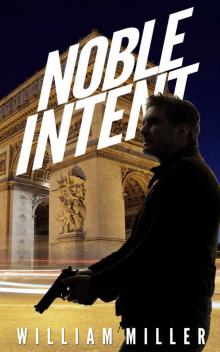 Noble Intent
Noble Intent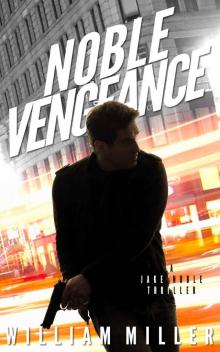 Noble Vengeance
Noble Vengeance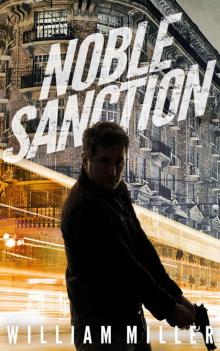 Noble Sanction
Noble Sanction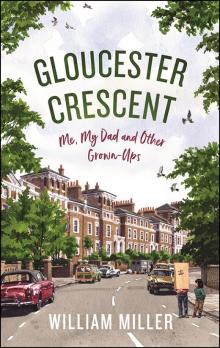 Gloucester Crescent
Gloucester Crescent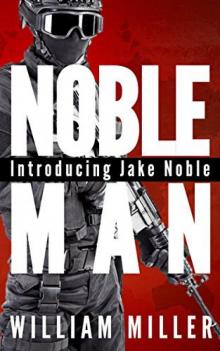 Noble Man
Noble Man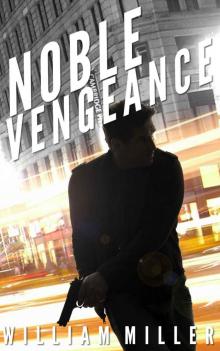 Noble Vengeance (Jake Noble Series Book 2)
Noble Vengeance (Jake Noble Series Book 2)